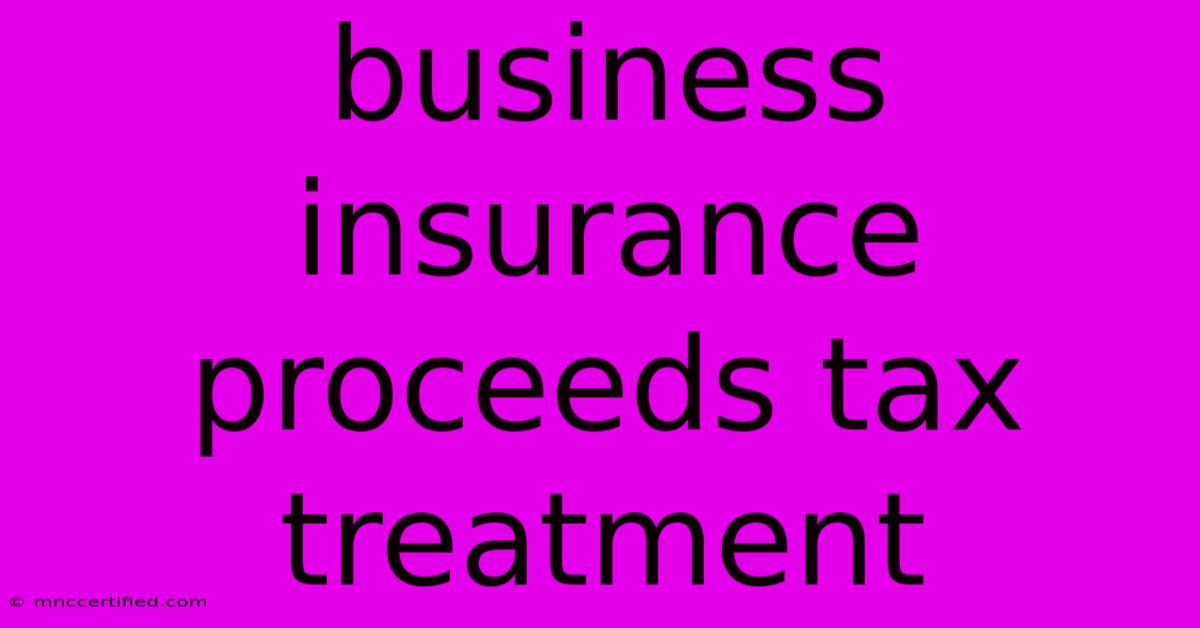Business Insurance Proceeds Tax Treatment

Table of Contents
Business Insurance Proceeds: Tax Treatment Explained
Business insurance is a vital component of any successful business, offering protection against unforeseen risks. However, the tax treatment of insurance proceeds can be complex and vary depending on the type of insurance and the specific circumstances. This article will guide you through the intricacies of tax treatment on business insurance proceeds, providing clarity on how these funds are viewed by the IRS.
Understanding Business Insurance Proceeds
Business insurance proceeds refer to the financial compensation received from an insurance policy after a covered event occurs. This could include various types of insurance, such as:
- Property insurance: Covering losses to physical assets like buildings, equipment, and inventory.
- Liability insurance: Protecting against claims for damages caused by the business or its employees.
- Business interruption insurance: Compensating for lost income due to a covered event disrupting operations.
- Key person insurance: Providing financial assistance upon the death or disability of a crucial employee.
Tax Treatment of Business Insurance Proceeds
The taxability of business insurance proceeds largely depends on the nature of the insured loss and the specific insurance policy. Here's a breakdown of different scenarios:
1. Insurance Proceeds for Business Property:
- Loss Due to a Casualty: Proceeds received for property losses due to events like fire, flood, or theft are typically tax-free. This is because the insurance payment is intended to compensate for the actual loss of value.
- Loss Due to Depreciation: If the insurance payment exceeds the depreciated value of the damaged property, the excess amount could be considered taxable income. This reflects the principle of restoring the business to its pre-loss condition, not exceeding the original value.
2. Insurance Proceeds for Business Interruption:
- Direct Coverage: Proceeds received for business interruption due to a covered event are taxable income. This is because the insurance payment represents compensation for lost profits and expenses during the period of interruption.
- Indirect Coverage: Proceeds received for indirect business interruption losses, such as extra expenses incurred to mitigate the effects of the event, may be tax-free. This depends on the policy wording and the specific nature of the expenses.
3. Insurance Proceeds for Liability Claims:
- Liability Settlements: Insurance payments received to settle claims related to bodily injury, property damage, or legal liability are taxable income. This is because the insurance payment is intended to reimburse the business for losses incurred as a result of the liability.
- Defense Costs: Legal fees incurred to defend against liability claims may be tax-deductible, subject to certain limitations.
4. Key Person Insurance Proceeds:
- Life Insurance: Proceeds received from a life insurance policy on a deceased employee are typically tax-free for the business. However, any cash value accumulated within the policy may be subject to taxation.
- Disability Insurance: Proceeds received for a disabled employee's lost income are taxable income to the business.
Tax Reporting & Documentation
It's essential to keep accurate records of all insurance proceeds received and related expenses. This documentation will be crucial for accurate tax reporting and potentially supporting claims for tax-free treatment. Here are some key points to remember:
- Form 1040 Schedule C: Business owners report income and expenses on this schedule, including insurance proceeds and related expenses.
- Form 1099-MISC: If the insurance company paid more than $10,000 to the business, you will receive a Form 1099-MISC reporting the payment.
- Supporting Documentation: Keep copies of insurance policies, claims documents, and receipts for related expenses for tax-related audits.
Consulting with a Tax Professional
The complexities of business insurance tax treatment can be overwhelming. It's always recommended to consult with a qualified tax professional who can advise you on specific scenarios and ensure your compliance with tax laws. They can provide personalized guidance based on your business structure, insurance policies, and specific circumstances.
Conclusion
Understanding the tax treatment of business insurance proceeds is vital for maximizing your business's financial well-being. By understanding the complexities and seeking professional advice when needed, you can ensure that your business operates smoothly and avoids unexpected tax burdens.

Thank you for visiting our website wich cover about Business Insurance Proceeds Tax Treatment. We hope the information provided has been useful to you. Feel free to contact us if you have any questions or need further assistance. See you next time and dont miss to bookmark.
Featured Posts
-
If You Hit A Deer Does Insurance Cover It
Nov 07, 2024
-
Commercial Trailer Insurance Requirements
Nov 07, 2024
-
Wisconsin Voters Approve Citizen Rights Changes
Nov 07, 2024
-
Buying A Car With A Bonded Title In Texas
Nov 07, 2024
-
Which Is Generally True Regarding Insureds
Nov 07, 2024